Business Governance in Global Markets: Leadership Approach Impact
VerifiedAdded on 2022/09/13
|9
|2566
|11
Report
AI Summary
This report examines the impact of leadership approaches on organizational performance within the context of global markets. It begins by outlining the research question, which focuses on the value of leadership in improving performance and addresses challenges faced by global leaders. The project aims to make business leaders aware of the skills needed for success in globalized markets, with objectives including understanding leadership roles and responsibilities in the global market environment. The background section discusses the importance of leadership and governance, communication skills, decision-making capabilities, and human resource management in international business. The report details the research design, employing qualitative interviews with managers from international organizations, and outlines the data collection, analysis, and ethical considerations. Anticipated results include insights into the challenges faced by leaders and their perspectives on enhancing organizational performance. The report concludes with a list of references.
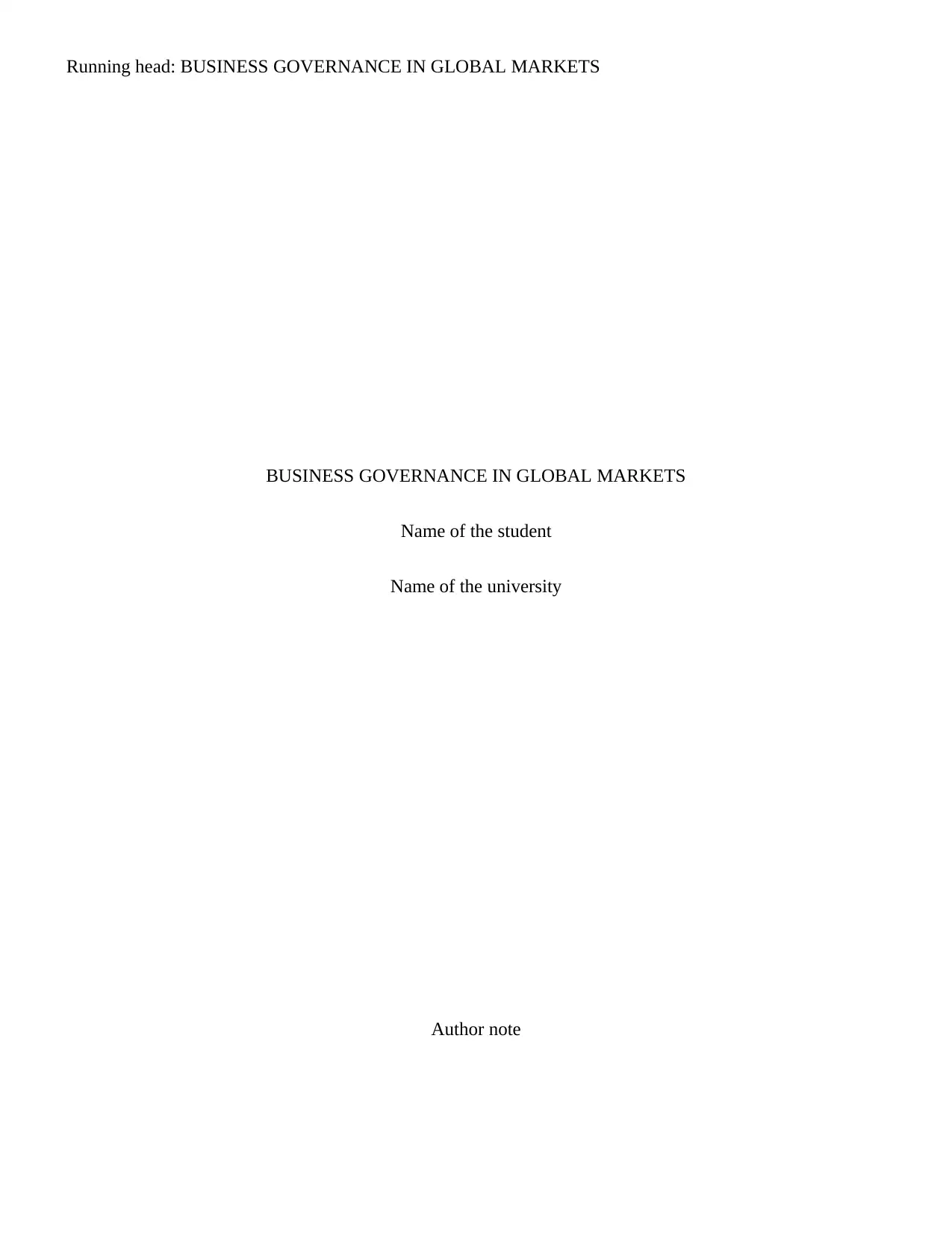
Running head: BUSINESS GOVERNANCE IN GLOBAL MARKETS
BUSINESS GOVERNANCE IN GLOBAL MARKETS
Name of the student
Name of the university
Author note
BUSINESS GOVERNANCE IN GLOBAL MARKETS
Name of the student
Name of the university
Author note
Paraphrase This Document
Need a fresh take? Get an instant paraphrase of this document with our AI Paraphraser
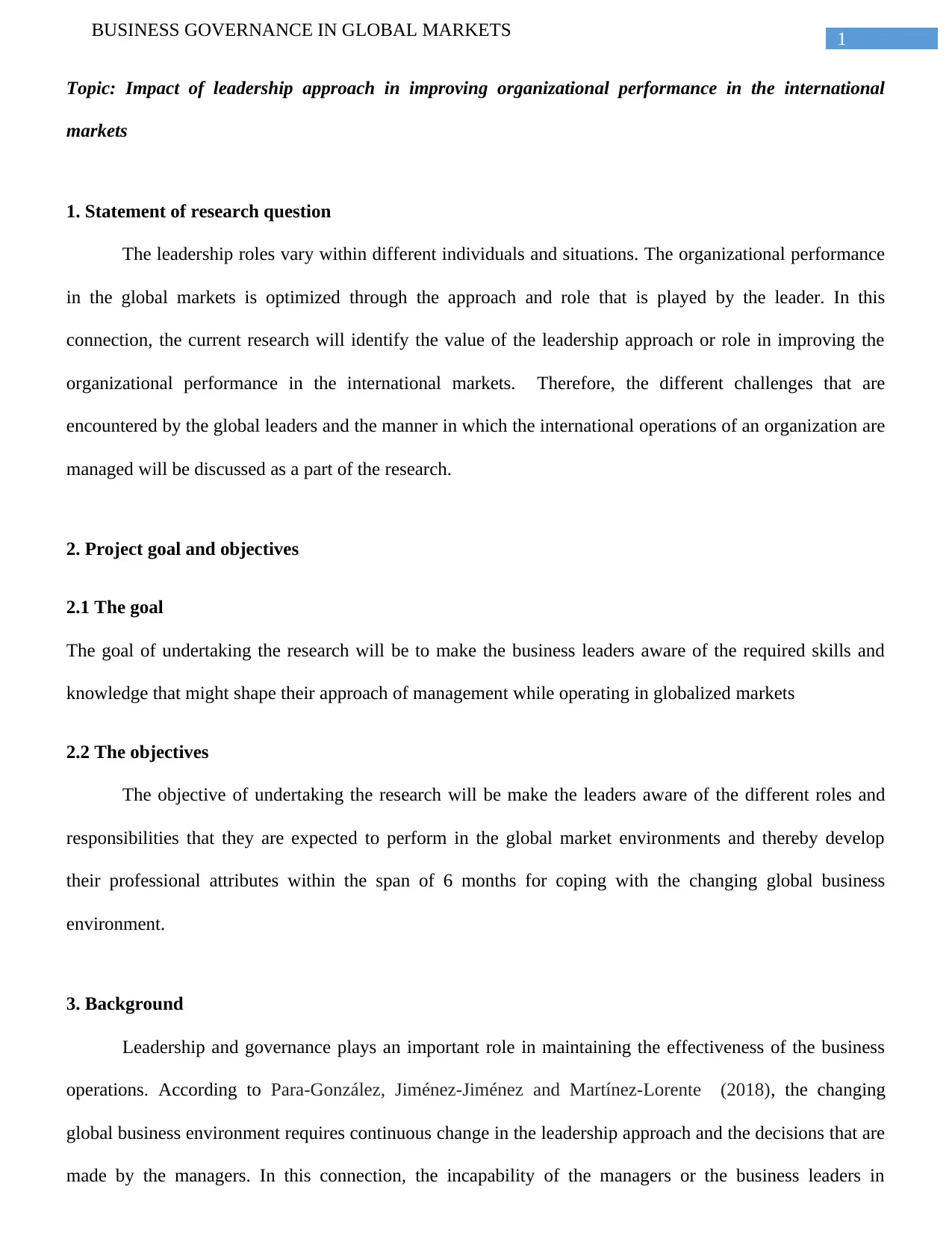
1BUSINESS GOVERNANCE IN GLOBAL MARKETS
Topic: Impact of leadership approach in improving organizational performance in the international
markets
1. Statement of research question
The leadership roles vary within different individuals and situations. The organizational performance
in the global markets is optimized through the approach and role that is played by the leader. In this
connection, the current research will identify the value of the leadership approach or role in improving the
organizational performance in the international markets. Therefore, the different challenges that are
encountered by the global leaders and the manner in which the international operations of an organization are
managed will be discussed as a part of the research.
2. Project goal and objectives
2.1 The goal
The goal of undertaking the research will be to make the business leaders aware of the required skills and
knowledge that might shape their approach of management while operating in globalized markets
2.2 The objectives
The objective of undertaking the research will be make the leaders aware of the different roles and
responsibilities that they are expected to perform in the global market environments and thereby develop
their professional attributes within the span of 6 months for coping with the changing global business
environment.
3. Background
Leadership and governance plays an important role in maintaining the effectiveness of the business
operations. According to Para-González, Jiménez-Jiménez and Martínez-Lorente (2018), the changing
global business environment requires continuous change in the leadership approach and the decisions that are
made by the managers. In this connection, the incapability of the managers or the business leaders in
Topic: Impact of leadership approach in improving organizational performance in the international
markets
1. Statement of research question
The leadership roles vary within different individuals and situations. The organizational performance
in the global markets is optimized through the approach and role that is played by the leader. In this
connection, the current research will identify the value of the leadership approach or role in improving the
organizational performance in the international markets. Therefore, the different challenges that are
encountered by the global leaders and the manner in which the international operations of an organization are
managed will be discussed as a part of the research.
2. Project goal and objectives
2.1 The goal
The goal of undertaking the research will be to make the business leaders aware of the required skills and
knowledge that might shape their approach of management while operating in globalized markets
2.2 The objectives
The objective of undertaking the research will be make the leaders aware of the different roles and
responsibilities that they are expected to perform in the global market environments and thereby develop
their professional attributes within the span of 6 months for coping with the changing global business
environment.
3. Background
Leadership and governance plays an important role in maintaining the effectiveness of the business
operations. According to Para-González, Jiménez-Jiménez and Martínez-Lorente (2018), the changing
global business environment requires continuous change in the leadership approach and the decisions that are
made by the managers. In this connection, the incapability of the managers or the business leaders in
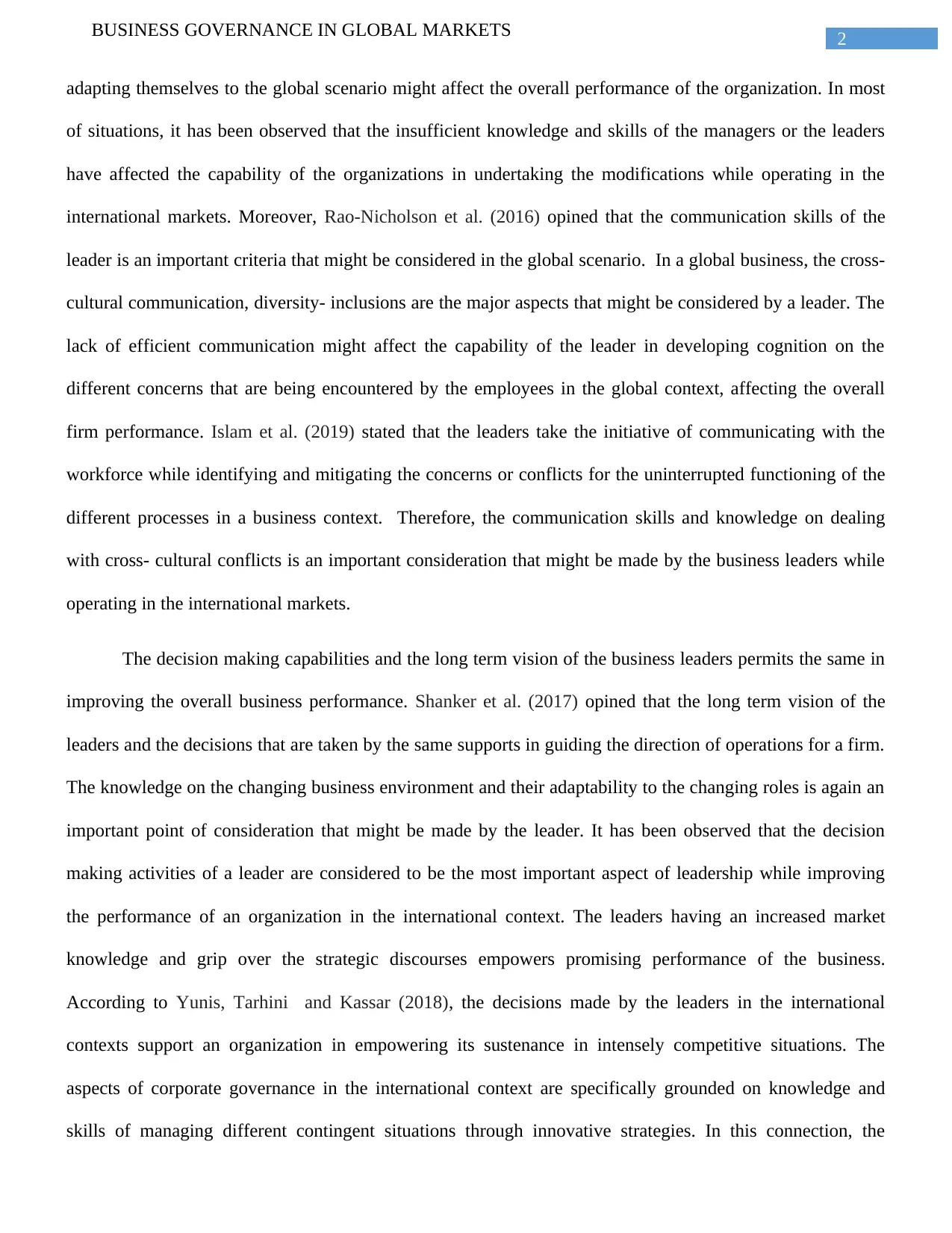
2BUSINESS GOVERNANCE IN GLOBAL MARKETS
adapting themselves to the global scenario might affect the overall performance of the organization. In most
of situations, it has been observed that the insufficient knowledge and skills of the managers or the leaders
have affected the capability of the organizations in undertaking the modifications while operating in the
international markets. Moreover, Rao-Nicholson et al. (2016) opined that the communication skills of the
leader is an important criteria that might be considered in the global scenario. In a global business, the cross-
cultural communication, diversity- inclusions are the major aspects that might be considered by a leader. The
lack of efficient communication might affect the capability of the leader in developing cognition on the
different concerns that are being encountered by the employees in the global context, affecting the overall
firm performance. Islam et al. (2019) stated that the leaders take the initiative of communicating with the
workforce while identifying and mitigating the concerns or conflicts for the uninterrupted functioning of the
different processes in a business context. Therefore, the communication skills and knowledge on dealing
with cross- cultural conflicts is an important consideration that might be made by the business leaders while
operating in the international markets.
The decision making capabilities and the long term vision of the business leaders permits the same in
improving the overall business performance. Shanker et al. (2017) opined that the long term vision of the
leaders and the decisions that are taken by the same supports in guiding the direction of operations for a firm.
The knowledge on the changing business environment and their adaptability to the changing roles is again an
important point of consideration that might be made by the leader. It has been observed that the decision
making activities of a leader are considered to be the most important aspect of leadership while improving
the performance of an organization in the international context. The leaders having an increased market
knowledge and grip over the strategic discourses empowers promising performance of the business.
According to Yunis, Tarhini and Kassar (2018), the decisions made by the leaders in the international
contexts support an organization in empowering its sustenance in intensely competitive situations. The
aspects of corporate governance in the international context are specifically grounded on knowledge and
skills of managing different contingent situations through innovative strategies. In this connection, the
adapting themselves to the global scenario might affect the overall performance of the organization. In most
of situations, it has been observed that the insufficient knowledge and skills of the managers or the leaders
have affected the capability of the organizations in undertaking the modifications while operating in the
international markets. Moreover, Rao-Nicholson et al. (2016) opined that the communication skills of the
leader is an important criteria that might be considered in the global scenario. In a global business, the cross-
cultural communication, diversity- inclusions are the major aspects that might be considered by a leader. The
lack of efficient communication might affect the capability of the leader in developing cognition on the
different concerns that are being encountered by the employees in the global context, affecting the overall
firm performance. Islam et al. (2019) stated that the leaders take the initiative of communicating with the
workforce while identifying and mitigating the concerns or conflicts for the uninterrupted functioning of the
different processes in a business context. Therefore, the communication skills and knowledge on dealing
with cross- cultural conflicts is an important consideration that might be made by the business leaders while
operating in the international markets.
The decision making capabilities and the long term vision of the business leaders permits the same in
improving the overall business performance. Shanker et al. (2017) opined that the long term vision of the
leaders and the decisions that are taken by the same supports in guiding the direction of operations for a firm.
The knowledge on the changing business environment and their adaptability to the changing roles is again an
important point of consideration that might be made by the leader. It has been observed that the decision
making activities of a leader are considered to be the most important aspect of leadership while improving
the performance of an organization in the international context. The leaders having an increased market
knowledge and grip over the strategic discourses empowers promising performance of the business.
According to Yunis, Tarhini and Kassar (2018), the decisions made by the leaders in the international
contexts support an organization in empowering its sustenance in intensely competitive situations. The
aspects of corporate governance in the international context are specifically grounded on knowledge and
skills of managing different contingent situations through innovative strategies. In this connection, the
⊘ This is a preview!⊘
Do you want full access?
Subscribe today to unlock all pages.

Trusted by 1+ million students worldwide
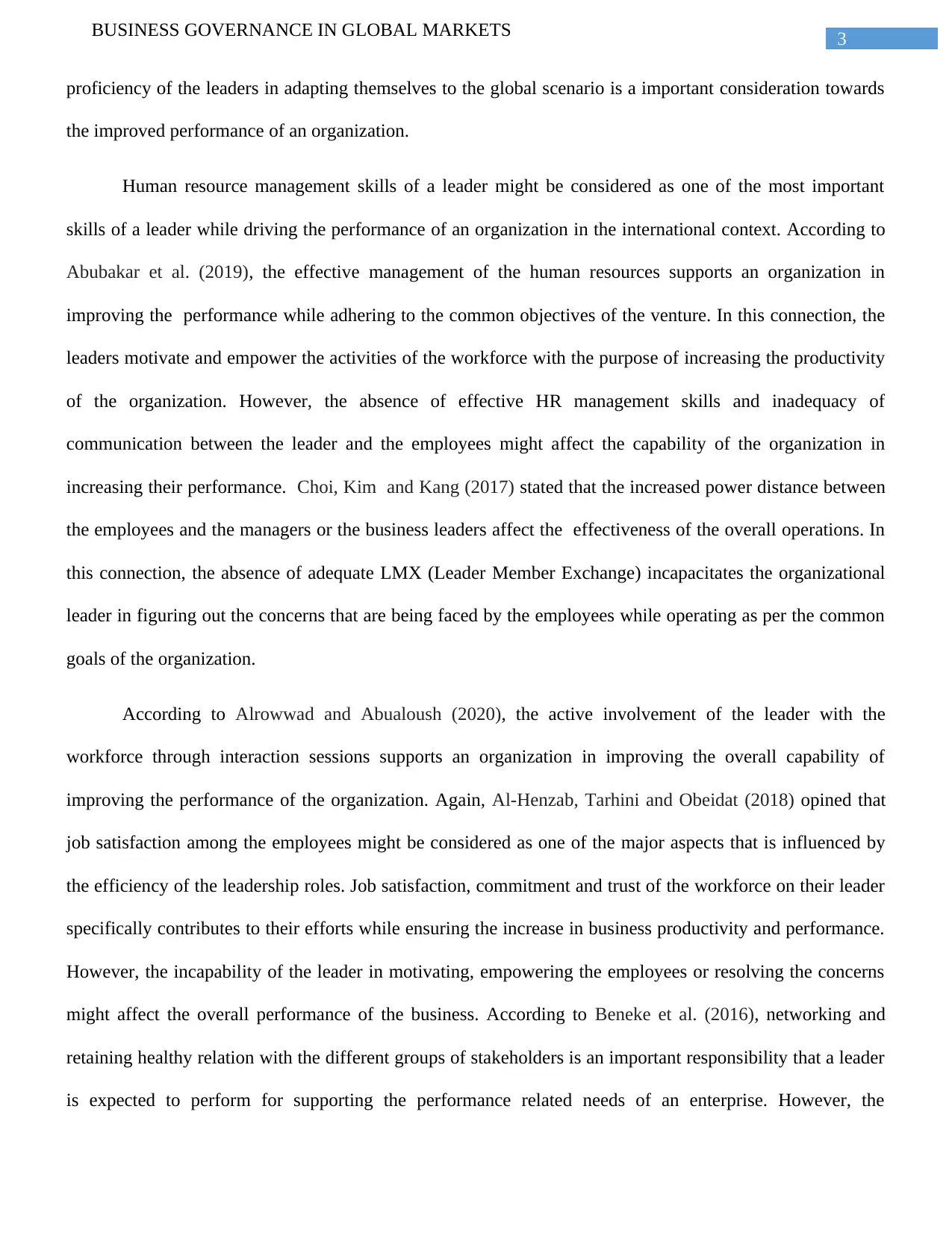
3BUSINESS GOVERNANCE IN GLOBAL MARKETS
proficiency of the leaders in adapting themselves to the global scenario is a important consideration towards
the improved performance of an organization.
Human resource management skills of a leader might be considered as one of the most important
skills of a leader while driving the performance of an organization in the international context. According to
Abubakar et al. (2019), the effective management of the human resources supports an organization in
improving the performance while adhering to the common objectives of the venture. In this connection, the
leaders motivate and empower the activities of the workforce with the purpose of increasing the productivity
of the organization. However, the absence of effective HR management skills and inadequacy of
communication between the leader and the employees might affect the capability of the organization in
increasing their performance. Choi, Kim and Kang (2017) stated that the increased power distance between
the employees and the managers or the business leaders affect the effectiveness of the overall operations. In
this connection, the absence of adequate LMX (Leader Member Exchange) incapacitates the organizational
leader in figuring out the concerns that are being faced by the employees while operating as per the common
goals of the organization.
According to Alrowwad and Abualoush (2020), the active involvement of the leader with the
workforce through interaction sessions supports an organization in improving the overall capability of
improving the performance of the organization. Again, Al-Henzab, Tarhini and Obeidat (2018) opined that
job satisfaction among the employees might be considered as one of the major aspects that is influenced by
the efficiency of the leadership roles. Job satisfaction, commitment and trust of the workforce on their leader
specifically contributes to their efforts while ensuring the increase in business productivity and performance.
However, the incapability of the leader in motivating, empowering the employees or resolving the concerns
might affect the overall performance of the business. According to Beneke et al. (2016), networking and
retaining healthy relation with the different groups of stakeholders is an important responsibility that a leader
is expected to perform for supporting the performance related needs of an enterprise. However, the
proficiency of the leaders in adapting themselves to the global scenario is a important consideration towards
the improved performance of an organization.
Human resource management skills of a leader might be considered as one of the most important
skills of a leader while driving the performance of an organization in the international context. According to
Abubakar et al. (2019), the effective management of the human resources supports an organization in
improving the performance while adhering to the common objectives of the venture. In this connection, the
leaders motivate and empower the activities of the workforce with the purpose of increasing the productivity
of the organization. However, the absence of effective HR management skills and inadequacy of
communication between the leader and the employees might affect the capability of the organization in
increasing their performance. Choi, Kim and Kang (2017) stated that the increased power distance between
the employees and the managers or the business leaders affect the effectiveness of the overall operations. In
this connection, the absence of adequate LMX (Leader Member Exchange) incapacitates the organizational
leader in figuring out the concerns that are being faced by the employees while operating as per the common
goals of the organization.
According to Alrowwad and Abualoush (2020), the active involvement of the leader with the
workforce through interaction sessions supports an organization in improving the overall capability of
improving the performance of the organization. Again, Al-Henzab, Tarhini and Obeidat (2018) opined that
job satisfaction among the employees might be considered as one of the major aspects that is influenced by
the efficiency of the leadership roles. Job satisfaction, commitment and trust of the workforce on their leader
specifically contributes to their efforts while ensuring the increase in business productivity and performance.
However, the incapability of the leader in motivating, empowering the employees or resolving the concerns
might affect the overall performance of the business. According to Beneke et al. (2016), networking and
retaining healthy relation with the different groups of stakeholders is an important responsibility that a leader
is expected to perform for supporting the performance related needs of an enterprise. However, the
Paraphrase This Document
Need a fresh take? Get an instant paraphrase of this document with our AI Paraphraser
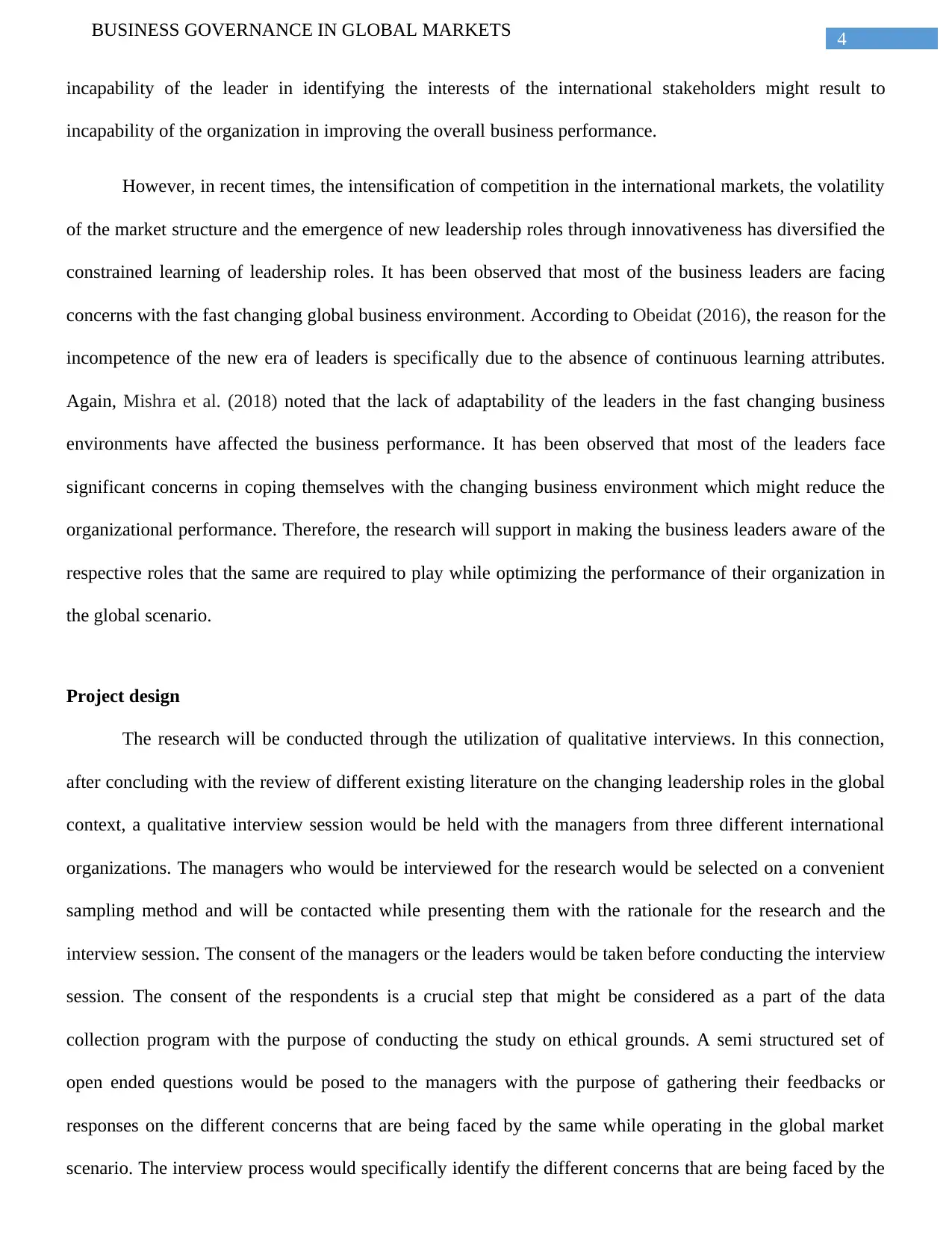
4BUSINESS GOVERNANCE IN GLOBAL MARKETS
incapability of the leader in identifying the interests of the international stakeholders might result to
incapability of the organization in improving the overall business performance.
However, in recent times, the intensification of competition in the international markets, the volatility
of the market structure and the emergence of new leadership roles through innovativeness has diversified the
constrained learning of leadership roles. It has been observed that most of the business leaders are facing
concerns with the fast changing global business environment. According to Obeidat (2016), the reason for the
incompetence of the new era of leaders is specifically due to the absence of continuous learning attributes.
Again, Mishra et al. (2018) noted that the lack of adaptability of the leaders in the fast changing business
environments have affected the business performance. It has been observed that most of the leaders face
significant concerns in coping themselves with the changing business environment which might reduce the
organizational performance. Therefore, the research will support in making the business leaders aware of the
respective roles that the same are required to play while optimizing the performance of their organization in
the global scenario.
Project design
The research will be conducted through the utilization of qualitative interviews. In this connection,
after concluding with the review of different existing literature on the changing leadership roles in the global
context, a qualitative interview session would be held with the managers from three different international
organizations. The managers who would be interviewed for the research would be selected on a convenient
sampling method and will be contacted while presenting them with the rationale for the research and the
interview session. The consent of the managers or the leaders would be taken before conducting the interview
session. The consent of the respondents is a crucial step that might be considered as a part of the data
collection program with the purpose of conducting the study on ethical grounds. A semi structured set of
open ended questions would be posed to the managers with the purpose of gathering their feedbacks or
responses on the different concerns that are being faced by the same while operating in the global market
scenario. The interview process would specifically identify the different concerns that are being faced by the
incapability of the leader in identifying the interests of the international stakeholders might result to
incapability of the organization in improving the overall business performance.
However, in recent times, the intensification of competition in the international markets, the volatility
of the market structure and the emergence of new leadership roles through innovativeness has diversified the
constrained learning of leadership roles. It has been observed that most of the business leaders are facing
concerns with the fast changing global business environment. According to Obeidat (2016), the reason for the
incompetence of the new era of leaders is specifically due to the absence of continuous learning attributes.
Again, Mishra et al. (2018) noted that the lack of adaptability of the leaders in the fast changing business
environments have affected the business performance. It has been observed that most of the leaders face
significant concerns in coping themselves with the changing business environment which might reduce the
organizational performance. Therefore, the research will support in making the business leaders aware of the
respective roles that the same are required to play while optimizing the performance of their organization in
the global scenario.
Project design
The research will be conducted through the utilization of qualitative interviews. In this connection,
after concluding with the review of different existing literature on the changing leadership roles in the global
context, a qualitative interview session would be held with the managers from three different international
organizations. The managers who would be interviewed for the research would be selected on a convenient
sampling method and will be contacted while presenting them with the rationale for the research and the
interview session. The consent of the managers or the leaders would be taken before conducting the interview
session. The consent of the respondents is a crucial step that might be considered as a part of the data
collection program with the purpose of conducting the study on ethical grounds. A semi structured set of
open ended questions would be posed to the managers with the purpose of gathering their feedbacks or
responses on the different concerns that are being faced by the same while operating in the global market
scenario. The interview process would specifically identify the different concerns that are being faced by the
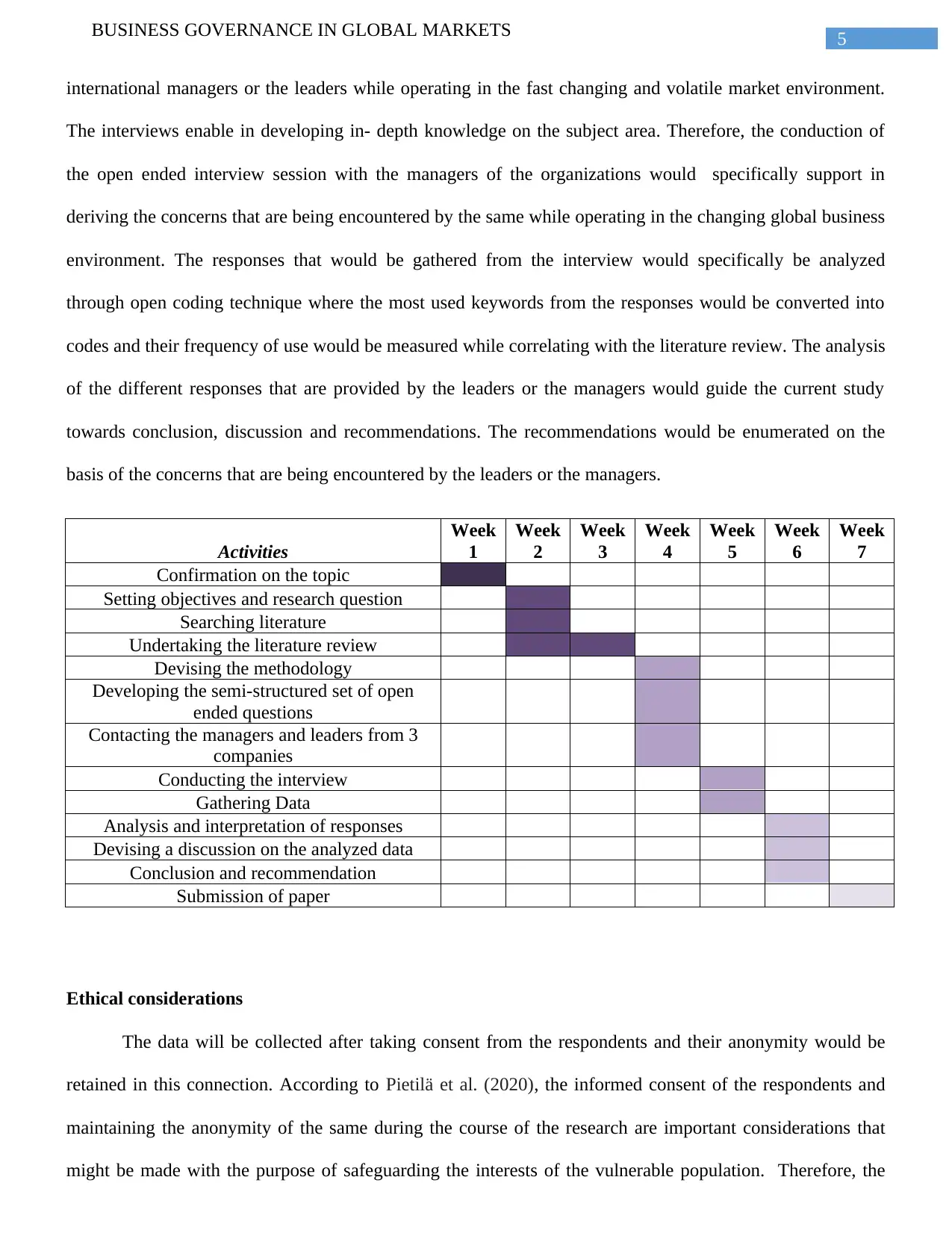
5BUSINESS GOVERNANCE IN GLOBAL MARKETS
international managers or the leaders while operating in the fast changing and volatile market environment.
The interviews enable in developing in- depth knowledge on the subject area. Therefore, the conduction of
the open ended interview session with the managers of the organizations would specifically support in
deriving the concerns that are being encountered by the same while operating in the changing global business
environment. The responses that would be gathered from the interview would specifically be analyzed
through open coding technique where the most used keywords from the responses would be converted into
codes and their frequency of use would be measured while correlating with the literature review. The analysis
of the different responses that are provided by the leaders or the managers would guide the current study
towards conclusion, discussion and recommendations. The recommendations would be enumerated on the
basis of the concerns that are being encountered by the leaders or the managers.
Activities
Week
1
Week
2
Week
3
Week
4
Week
5
Week
6
Week
7
Confirmation on the topic
Setting objectives and research question
Searching literature
Undertaking the literature review
Devising the methodology
Developing the semi-structured set of open
ended questions
Contacting the managers and leaders from 3
companies
Conducting the interview
Gathering Data
Analysis and interpretation of responses
Devising a discussion on the analyzed data
Conclusion and recommendation
Submission of paper
Ethical considerations
The data will be collected after taking consent from the respondents and their anonymity would be
retained in this connection. According to Pietilä et al. (2020), the informed consent of the respondents and
maintaining the anonymity of the same during the course of the research are important considerations that
might be made with the purpose of safeguarding the interests of the vulnerable population. Therefore, the
international managers or the leaders while operating in the fast changing and volatile market environment.
The interviews enable in developing in- depth knowledge on the subject area. Therefore, the conduction of
the open ended interview session with the managers of the organizations would specifically support in
deriving the concerns that are being encountered by the same while operating in the changing global business
environment. The responses that would be gathered from the interview would specifically be analyzed
through open coding technique where the most used keywords from the responses would be converted into
codes and their frequency of use would be measured while correlating with the literature review. The analysis
of the different responses that are provided by the leaders or the managers would guide the current study
towards conclusion, discussion and recommendations. The recommendations would be enumerated on the
basis of the concerns that are being encountered by the leaders or the managers.
Activities
Week
1
Week
2
Week
3
Week
4
Week
5
Week
6
Week
7
Confirmation on the topic
Setting objectives and research question
Searching literature
Undertaking the literature review
Devising the methodology
Developing the semi-structured set of open
ended questions
Contacting the managers and leaders from 3
companies
Conducting the interview
Gathering Data
Analysis and interpretation of responses
Devising a discussion on the analyzed data
Conclusion and recommendation
Submission of paper
Ethical considerations
The data will be collected after taking consent from the respondents and their anonymity would be
retained in this connection. According to Pietilä et al. (2020), the informed consent of the respondents and
maintaining the anonymity of the same during the course of the research are important considerations that
might be made with the purpose of safeguarding the interests of the vulnerable population. Therefore, the
⊘ This is a preview!⊘
Do you want full access?
Subscribe today to unlock all pages.

Trusted by 1+ million students worldwide
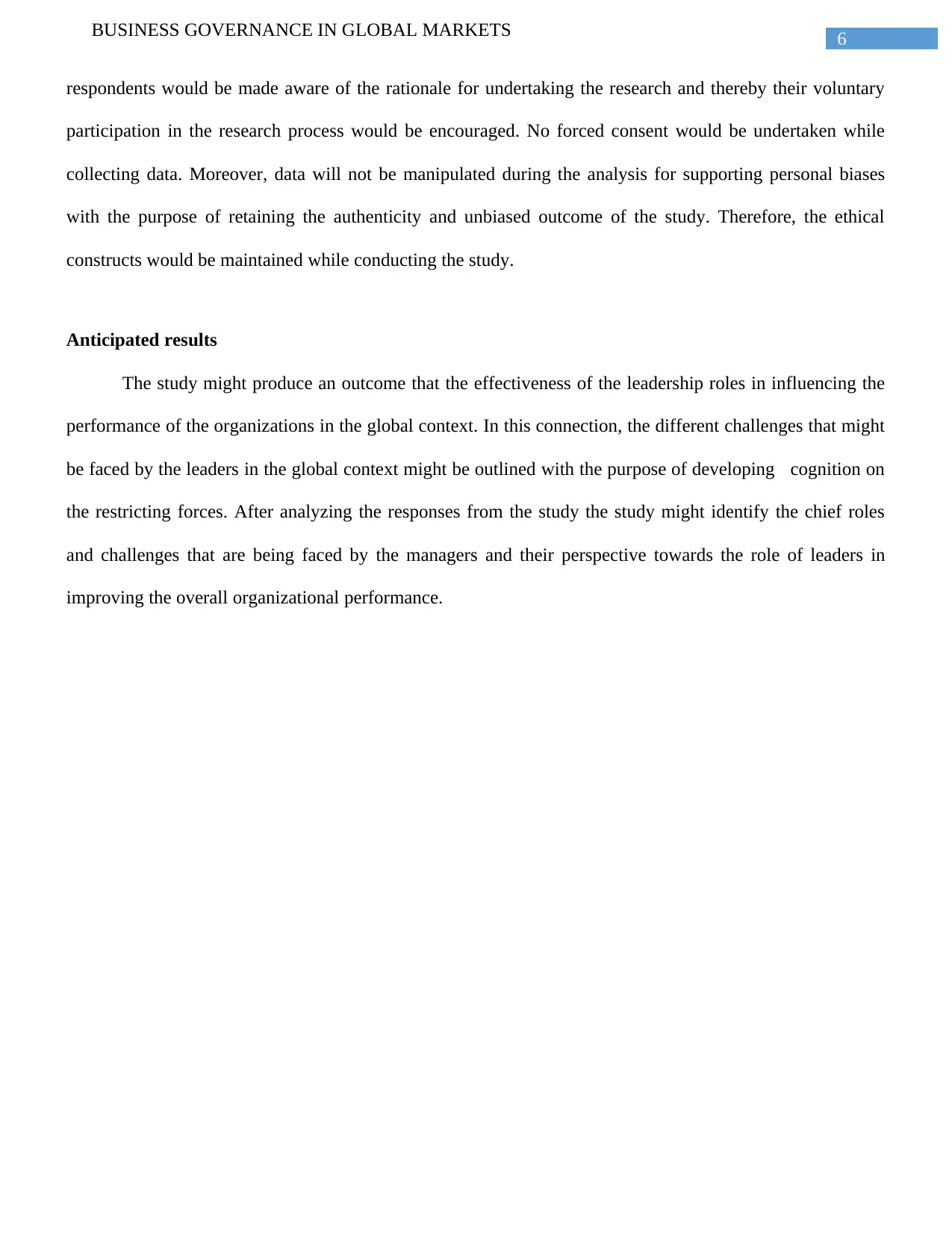
6BUSINESS GOVERNANCE IN GLOBAL MARKETS
respondents would be made aware of the rationale for undertaking the research and thereby their voluntary
participation in the research process would be encouraged. No forced consent would be undertaken while
collecting data. Moreover, data will not be manipulated during the analysis for supporting personal biases
with the purpose of retaining the authenticity and unbiased outcome of the study. Therefore, the ethical
constructs would be maintained while conducting the study.
Anticipated results
The study might produce an outcome that the effectiveness of the leadership roles in influencing the
performance of the organizations in the global context. In this connection, the different challenges that might
be faced by the leaders in the global context might be outlined with the purpose of developing cognition on
the restricting forces. After analyzing the responses from the study the study might identify the chief roles
and challenges that are being faced by the managers and their perspective towards the role of leaders in
improving the overall organizational performance.
respondents would be made aware of the rationale for undertaking the research and thereby their voluntary
participation in the research process would be encouraged. No forced consent would be undertaken while
collecting data. Moreover, data will not be manipulated during the analysis for supporting personal biases
with the purpose of retaining the authenticity and unbiased outcome of the study. Therefore, the ethical
constructs would be maintained while conducting the study.
Anticipated results
The study might produce an outcome that the effectiveness of the leadership roles in influencing the
performance of the organizations in the global context. In this connection, the different challenges that might
be faced by the leaders in the global context might be outlined with the purpose of developing cognition on
the restricting forces. After analyzing the responses from the study the study might identify the chief roles
and challenges that are being faced by the managers and their perspective towards the role of leaders in
improving the overall organizational performance.
Paraphrase This Document
Need a fresh take? Get an instant paraphrase of this document with our AI Paraphraser
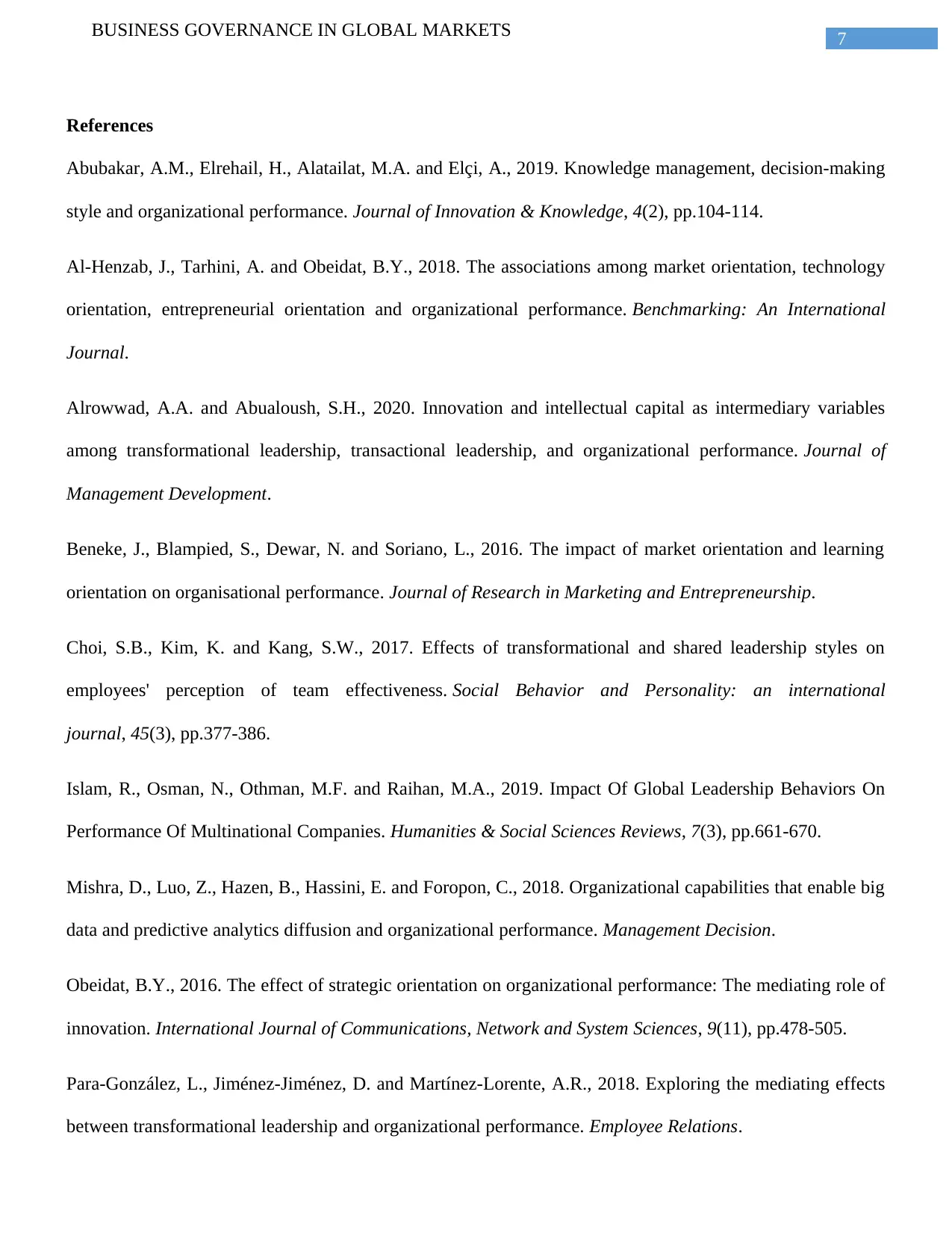
7BUSINESS GOVERNANCE IN GLOBAL MARKETS
References
Abubakar, A.M., Elrehail, H., Alatailat, M.A. and Elçi, A., 2019. Knowledge management, decision-making
style and organizational performance. Journal of Innovation & Knowledge, 4(2), pp.104-114.
Al-Henzab, J., Tarhini, A. and Obeidat, B.Y., 2018. The associations among market orientation, technology
orientation, entrepreneurial orientation and organizational performance. Benchmarking: An International
Journal.
Alrowwad, A.A. and Abualoush, S.H., 2020. Innovation and intellectual capital as intermediary variables
among transformational leadership, transactional leadership, and organizational performance. Journal of
Management Development.
Beneke, J., Blampied, S., Dewar, N. and Soriano, L., 2016. The impact of market orientation and learning
orientation on organisational performance. Journal of Research in Marketing and Entrepreneurship.
Choi, S.B., Kim, K. and Kang, S.W., 2017. Effects of transformational and shared leadership styles on
employees' perception of team effectiveness. Social Behavior and Personality: an international
journal, 45(3), pp.377-386.
Islam, R., Osman, N., Othman, M.F. and Raihan, M.A., 2019. Impact Of Global Leadership Behaviors On
Performance Of Multinational Companies. Humanities & Social Sciences Reviews, 7(3), pp.661-670.
Mishra, D., Luo, Z., Hazen, B., Hassini, E. and Foropon, C., 2018. Organizational capabilities that enable big
data and predictive analytics diffusion and organizational performance. Management Decision.
Obeidat, B.Y., 2016. The effect of strategic orientation on organizational performance: The mediating role of
innovation. International Journal of Communications, Network and System Sciences, 9(11), pp.478-505.
Para-González, L., Jiménez-Jiménez, D. and Martínez-Lorente, A.R., 2018. Exploring the mediating effects
between transformational leadership and organizational performance. Employee Relations.
References
Abubakar, A.M., Elrehail, H., Alatailat, M.A. and Elçi, A., 2019. Knowledge management, decision-making
style and organizational performance. Journal of Innovation & Knowledge, 4(2), pp.104-114.
Al-Henzab, J., Tarhini, A. and Obeidat, B.Y., 2018. The associations among market orientation, technology
orientation, entrepreneurial orientation and organizational performance. Benchmarking: An International
Journal.
Alrowwad, A.A. and Abualoush, S.H., 2020. Innovation and intellectual capital as intermediary variables
among transformational leadership, transactional leadership, and organizational performance. Journal of
Management Development.
Beneke, J., Blampied, S., Dewar, N. and Soriano, L., 2016. The impact of market orientation and learning
orientation on organisational performance. Journal of Research in Marketing and Entrepreneurship.
Choi, S.B., Kim, K. and Kang, S.W., 2017. Effects of transformational and shared leadership styles on
employees' perception of team effectiveness. Social Behavior and Personality: an international
journal, 45(3), pp.377-386.
Islam, R., Osman, N., Othman, M.F. and Raihan, M.A., 2019. Impact Of Global Leadership Behaviors On
Performance Of Multinational Companies. Humanities & Social Sciences Reviews, 7(3), pp.661-670.
Mishra, D., Luo, Z., Hazen, B., Hassini, E. and Foropon, C., 2018. Organizational capabilities that enable big
data and predictive analytics diffusion and organizational performance. Management Decision.
Obeidat, B.Y., 2016. The effect of strategic orientation on organizational performance: The mediating role of
innovation. International Journal of Communications, Network and System Sciences, 9(11), pp.478-505.
Para-González, L., Jiménez-Jiménez, D. and Martínez-Lorente, A.R., 2018. Exploring the mediating effects
between transformational leadership and organizational performance. Employee Relations.
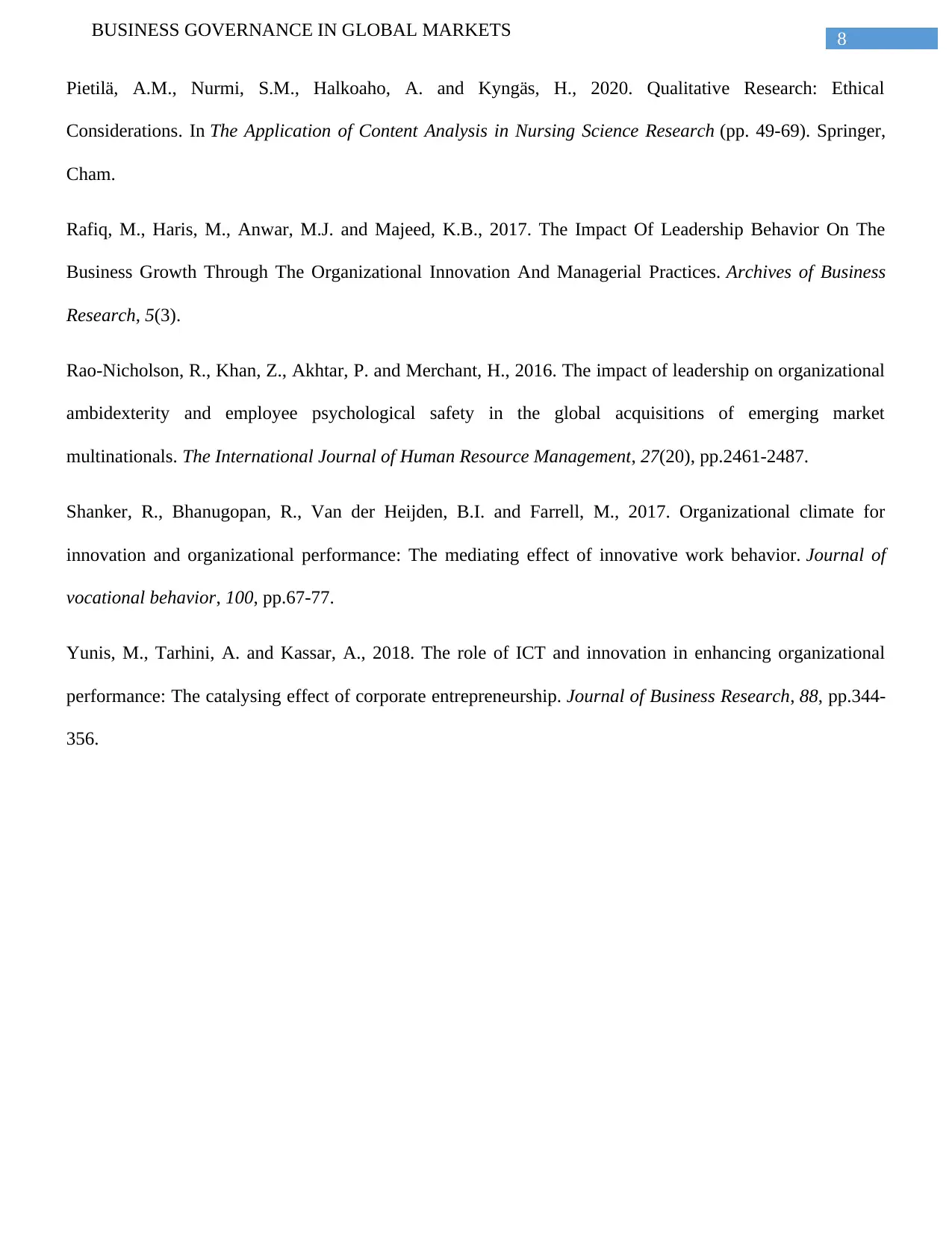
8BUSINESS GOVERNANCE IN GLOBAL MARKETS
Pietilä, A.M., Nurmi, S.M., Halkoaho, A. and Kyngäs, H., 2020. Qualitative Research: Ethical
Considerations. In The Application of Content Analysis in Nursing Science Research (pp. 49-69). Springer,
Cham.
Rafiq, M., Haris, M., Anwar, M.J. and Majeed, K.B., 2017. The Impact Of Leadership Behavior On The
Business Growth Through The Organizational Innovation And Managerial Practices. Archives of Business
Research, 5(3).
Rao-Nicholson, R., Khan, Z., Akhtar, P. and Merchant, H., 2016. The impact of leadership on organizational
ambidexterity and employee psychological safety in the global acquisitions of emerging market
multinationals. The International Journal of Human Resource Management, 27(20), pp.2461-2487.
Shanker, R., Bhanugopan, R., Van der Heijden, B.I. and Farrell, M., 2017. Organizational climate for
innovation and organizational performance: The mediating effect of innovative work behavior. Journal of
vocational behavior, 100, pp.67-77.
Yunis, M., Tarhini, A. and Kassar, A., 2018. The role of ICT and innovation in enhancing organizational
performance: The catalysing effect of corporate entrepreneurship. Journal of Business Research, 88, pp.344-
356.
Pietilä, A.M., Nurmi, S.M., Halkoaho, A. and Kyngäs, H., 2020. Qualitative Research: Ethical
Considerations. In The Application of Content Analysis in Nursing Science Research (pp. 49-69). Springer,
Cham.
Rafiq, M., Haris, M., Anwar, M.J. and Majeed, K.B., 2017. The Impact Of Leadership Behavior On The
Business Growth Through The Organizational Innovation And Managerial Practices. Archives of Business
Research, 5(3).
Rao-Nicholson, R., Khan, Z., Akhtar, P. and Merchant, H., 2016. The impact of leadership on organizational
ambidexterity and employee psychological safety in the global acquisitions of emerging market
multinationals. The International Journal of Human Resource Management, 27(20), pp.2461-2487.
Shanker, R., Bhanugopan, R., Van der Heijden, B.I. and Farrell, M., 2017. Organizational climate for
innovation and organizational performance: The mediating effect of innovative work behavior. Journal of
vocational behavior, 100, pp.67-77.
Yunis, M., Tarhini, A. and Kassar, A., 2018. The role of ICT and innovation in enhancing organizational
performance: The catalysing effect of corporate entrepreneurship. Journal of Business Research, 88, pp.344-
356.
⊘ This is a preview!⊘
Do you want full access?
Subscribe today to unlock all pages.

Trusted by 1+ million students worldwide
1 out of 9
Related Documents
Your All-in-One AI-Powered Toolkit for Academic Success.
+13062052269
info@desklib.com
Available 24*7 on WhatsApp / Email
![[object Object]](/_next/static/media/star-bottom.7253800d.svg)
Unlock your academic potential
Copyright © 2020–2025 A2Z Services. All Rights Reserved. Developed and managed by ZUCOL.





